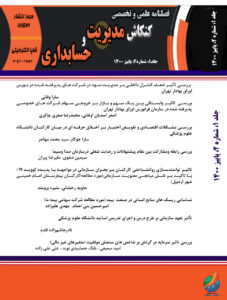مقاله: پژوهشی
صفحه: 259- 289
نویسندگان:
نگار چیوائی[1]
[1]کارشناس ارشد مدیریت آموزشی n.chivaee@gmail.com
چکیده
هدف اصلی این پژوهش بررسی تأثیر باورهای هوشی، باورهای فراشناخت و سازگاری اجتماعی بر عملکرد تحصیلی دانش آموزان دختر پایه نهم مقطع متوسطه اول شهر الیگودرز میباشد. در تحقيق حاضر، جامعه آماري شامل کلیهی دانش آموزان دختر پایه نهم مقطع متوسطه اول شهر الیگودرز ایران میباشد که برابر با 742 نفر بوده است. از بین جامعه آماری تعداد 253 نفر را با استفاده از روش نمونه گیری کوکران به عنوان نمونه آماری انتخاب و روش نمونهگیری مورد استفاده از نوع تصادفي ساده ميباشد. در اين پژوهش براي جمع آوري دادهها از پرسشنامه استاندارد باورهای هوشی بابابی (1377)، پرسشنامه استاندارد باورهای فراشناخت ولز (1997)، پرسشنامه استاندارد سازگاری اجتماعی سینها و سینگ (1993) و پرسشنامه استاندارد عملکرد تحصیلی زارعی مجد (1400) استفاده شده است. همچنین میزان روایی و پایایی متغیرها محاسبه شد که متغیرها و مولفهای آنها از روایی و پایایی مطلوبی برخوردار شدند. برای تجزیه و تحلیل اطلاعات از آزمونهای تحلیل عاملی و معادلات ساختاری با استفاده از نرمافزارهای آماری Spss 22 و Smart Pls انجام شده است. نتایج تحقیق نشان میدهد، باورهای هوشی بر عملکرد تحصیلی دانش آموزان دختر پایه نهم مقطع متوسطه اول شهر الیگودرز، سازگاری اجتماعی بر عملکرد تحصیلی دانش آموزان دختر پایه نهم مقطع متوسطه اول شهر الیگودرز، تأثیر مثبت و معناداری ندارد. همچنین باورهای فراشناخت بر عملکرد تحصیلی دانش آموزان دختر پایه نهم مقطع متوسطه اول شهر الیگودرز، تأثیر معناداری ندارد.
کلمات کلیدی:
باورهای هوشی، باورهای فراشناخت، سازگاری اجتماعی، عملکرد تحصیلی
The effect of intelligence beliefs, metacognitive beliefs and social adjustment on academic performance
Negar Chivai[1]
[1] Senior expert in educational management n.chivaee@gmail.com
abstract
The main purpose of this research is to investigate the effect of intelligence beliefs, metacognitive beliefs and social adjustment on the academic performance of 9th grade female students of the first secondary school in Aliguderz city. In the current research, the statistical population includes all the ninth grade female students of the first secondary school in Aligudarz, Iran, which is equal to 742 people. 253 people were selected from the statistical population using Cochran’s sampling method as a statistical sample and the sampling method used is simple random. In this research, Hoshi Bababi’s Standard Beliefs Questionnaire (1377), Wells’ Standard Metacognitive Beliefs Questionnaire (1997), Sinha and Singh’s Standard Social Adaptation Questionnaire (1993) and Zarei Majd’s Standard Academic Performance Questionnaire (1400) were used to collect data. Is. Also, the validity and reliability of the variables were calculated, and the variables and their components had good validity and reliability. For data analysis, factor analysis tests and structural equations have been performed using Spss 22 and Smart Pls statistical software. The results of the research show that intelligence beliefs have no positive and significant effect on the academic performance of ninth grade female students of the first secondary school of Aligudarz city, social adjustment does not have a positive and significant effect on the academic performance of ninth grade female students of the first secondary school of Aligudarz city. Also, metacognitive beliefs do not have a significant effect on the academic performance of ninth grade female students of the first secondary school in Aliguderz.
Keywords:
Intelligence beliefs, metacognitive beliefs, social adjustment, academic performance
